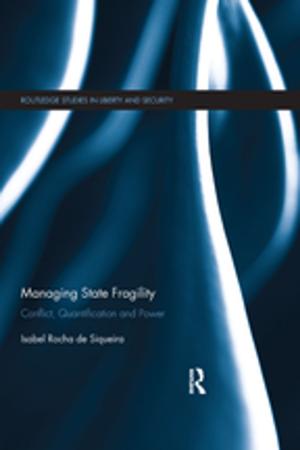Justice and Home Affairs Agencies in the European Union
Nonfiction, Social & Cultural Studies, Political Science| Author: | ISBN: | 9781317674627 | |
| Publisher: | Taylor and Francis | Publication: | January 22, 2016 |
| Imprint: | Routledge | Language: | English |
| Author: | |
| ISBN: | 9781317674627 |
| Publisher: | Taylor and Francis |
| Publication: | January 22, 2016 |
| Imprint: | Routledge |
| Language: | English |
This book examines the role of agencies and agency-like bodies in the EU’s Area of Freedom, Security and Justice (AFSJ).When the Maastricht Treaty entered into force on 1 November 1993, the institutional landscape of the so-called ‘Third Pillar’ looked significantly different than it does now. Aside from Europol, which existed only on paper at that time, the European agencies examined in this book were mere ideas in the heads of federalist dreamers or were not even contemplated. Eventually, Europol slowly emerged from its embryonic European Drugs Unit and became operational in 1999. Around the same time, the European Union (EU) unveiled plans in its Tampere Programme for a more extensive legal and institutional infrastructure for internal security policies. Since then, as evidenced by the chapters presented in this book, numerous policy developments have taken place. Indeed, the agencies now operating in the EU’s Area of Freedom, Security and Justice (AFSJ) are remarkable in the burgeoning scope of their activities, as well as their gradually increasing autonomy vis-à-vis the EU member states and the institutions that brought them to life.
This book was published as a special issue of Perspectives on European Politics and Society.
This book examines the role of agencies and agency-like bodies in the EU’s Area of Freedom, Security and Justice (AFSJ).When the Maastricht Treaty entered into force on 1 November 1993, the institutional landscape of the so-called ‘Third Pillar’ looked significantly different than it does now. Aside from Europol, which existed only on paper at that time, the European agencies examined in this book were mere ideas in the heads of federalist dreamers or were not even contemplated. Eventually, Europol slowly emerged from its embryonic European Drugs Unit and became operational in 1999. Around the same time, the European Union (EU) unveiled plans in its Tampere Programme for a more extensive legal and institutional infrastructure for internal security policies. Since then, as evidenced by the chapters presented in this book, numerous policy developments have taken place. Indeed, the agencies now operating in the EU’s Area of Freedom, Security and Justice (AFSJ) are remarkable in the burgeoning scope of their activities, as well as their gradually increasing autonomy vis-à-vis the EU member states and the institutions that brought them to life.
This book was published as a special issue of Perspectives on European Politics and Society.















